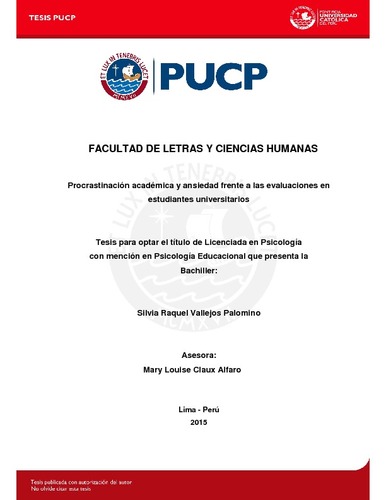Procrastinación académica y ansiedad frente a las evaluaciones en estudiantes universitarios
Abstract
La investigación tuvo como objetivo determinar la relación que existe entre la procrastinación académica y la ansiedad ante las evaluaciones. La muestra estuvo conformada por 130 estudiantes de una universidad privada de Lima, 68 de Ingeniería y 62 de Comunicaciones. Se utilizaron la Escala de Procrastinación Académica de Solomon & Rothblum (1984) y la escala de Reacción ante las Evaluaciones de Sarason (1984), ambas traducidas para este estudio. A través de un análisis factorial se identificaron los principales factores para cada escala, encontrándose tres que explican las razones para procrastinar: creencias sobre falta de recursos, reacción negativa ante expectativas o exigencias propias o del entorno y falta de energía para iniciar la tarea; y tres sobre las reacciones ante las evaluaciones: pensamientos negativos antes y durante las evaluaciones, pensamientos irrelevantes y distractores, y síntomas fisiológicos de malestar. Los resultados confirmaron la correlación entre las razones para procrastinar y los factores de las reacciones ante las evaluaciones, en especial, con los pensamientos negativos. Además, las mujeres obtuvieron promedios más altos en el factor de síntomas físiológicos de malestar; en contraste, los hombres obtuvieron mayor puntaje en la procrastinación de ciertas actividades académicas. No se encontró diferencia significativa en el puntaje global de razones de procrastinación según facultad de estudios. Sin embargo, los alumnos de Ingeniería percibieron en mayor grado la postergación de la tarea como un problema y reportaron una mayor procrastinación al realizar tareas de tipo académico-administrativas. The research aimed to determine the relation between academic procrastination and test anxiety. The sample comprised 130 students of a private university in Lima, 68 students from the Program of Engineering and 62 from the Program of Communications. Measures used were the Procrastination Assessment Scale-Students (Solomon & Rothblum, 1984) and the Reaction to Tests Sarason, 1984), both translated for this study. Factor analyses of both scales were carry out three factors explained the reasons to procrastinate: Beliefs about lack of resources, Negative reaction to expectations or requirements of self or others, and Lack of energy to start the task; and three factors were found in the Reaction to Tests Scale: Negative thoughts before and during testing, Distractions and irrelevant thoughts, and Physiological symptoms of discomfort. Results showed a correlation between Reasons to Procrastinate and factors of Reaction to Test Scale, especially with Negative thoughts. Also gender differences were found, where women had higher scores in levels of Anxiety and Physical symptoms of distress in their Reactions to tests, and men obtained higher scores on the procrastination of certain academic activities. There were no significant differences between Career Programs in their Procrastination global score. Nevertheless, engineering students showed higher scores in the Degree in which the Postponed Task was perceived as a Problem and in Academic-Administrative tasks Procrastination.
Temas
Postergación (Psicología)
Ansiedad
Estudiantes universitarios--Investigaciones
Ansiedad
Estudiantes universitarios--Investigaciones
Para optar el título de
Licenciado en Psicología Educacional






